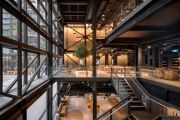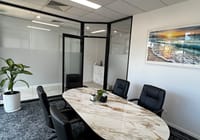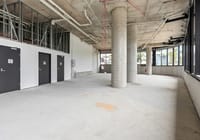
How to turn an empty office tower into a hotel
Zed Sanjana, the CEO of serviced-apartment group Veriu, says incentives are needed to encourage more office-to-hotel conversions – especially in places like the Melbourne CBD – after completing its first such project in Canberra.
Last week, Veriu opened the doors to a new 76-key Punthill apartment hotel in what was previously the Tuggeranong Innovation Centre on Anketell Street, following a circa $11 million-retrofit in partnership with a local developer.

“It opened a week ago and is trading really well. By getting it done, we’ve demonstrated that these projects are achievable, as opposed to just talking about them,” Mr Sanjana told The Australian Financial Review.
Off the back of this success, Veriu is in talks with the owners of six vacant office buildings in the Melbourne CBD about converting them into apartment hotels.
Veriu is also working with prominent developer Ross Pelligra on the transformation of “one of Adelaide’s ugliest office buildings” at 80 King William Street into an 188-room Veriu apartment hotel it hopes to open in about a year’s time.
“I’d be surprised if we didn’t progress at least two [of the Melbourne discussions],” Mr Sanjana said.
The six Melbourne buildings being assessed for conversion to hotel apartments are just a drop in the ocean for a CBD office market where the vacancy rate hit 20 per cent in July and where many B- and C-grade buildings sit vacant.

Last year, an audit by architects Hassell and consultants Ethos Urban on behalf of the Property Council of Australia found 86 Melbourne office buildings constructed before 1990 were “ripe for adaptive reuse” into more than 10,000 apartments.
In its Housing Statement released just over a year ago, the Victorian government committed to work with the PCA and the City of Melbourne “to consider opportunities to facilitate the conversion of these offices” into apartments.
A spokesperson re-affirmed the state government’s commitment to “fast track approvals to convert eligible commercial offices and mixed-use properties into apartments”.
“We’re not going to slow down, we’re going to double down – and we will soon outline new key policy changes to enable even more homes to be built,” the Victorian government spokesperson added.
Mr Sanjana said there had been a lot of the right intent shown by governments, “but not much action”.

He said state and local governments needed to embrace a more flexible approach towards planning regulations and building codes, and to consider incentives, such as increased height as well as tax reform.
“We need to follow up with incentives for better FSR (floor space ratio) outcomes, as a concession for re-adapting buildings rather than building new ones,” Mr Sanjana said.
Cath Evans, Victorian executive director at the PCA, agreed that incentives were needed “across different tiers of government to support the repurposing of existing older buildings to a variety of new uses”.
“These incentives should incorporate a package of measures, including uplift provisions, tax and rates relief, adaptable application of design standards and recognition of carbon emission reduction,” Ms Evan said.
“Incentives would close the feasibility gap and bring some of our older buildings back to life as a range of new residential and commercial developments, including hotels.
“The Property Council has had encouraging dialogue with the City of Melbourne and Victorian government on incentives, which will continue after the local government elections.”
Mr Sanjana said serviced apartments (typically a large hotel room with self-catering facilities and laundry services) were often a better fit for office conversions than residential apartments.
“Doing pure residential can be tricky because of limited floor plate sizes, limited aspects and because there is often no car parking. A serviced apartment is often more efficient to build [within office floor plates], which is why we have seen such a strong level of enquiry in the last six months.”
The conversion of the Canberra office building into a hotel had been a “bumpy ride” Mr Sanjana said, with some unexpected “oh gosh” movements along the way that had added about 15 per cent to the initial $10 million budget.
The biggest issue he said, had been around complying with current building codes, which required that the entire building be reglazed as if it were a brand-new greenfield project.
“If it had continued to operate as an office building, the energy rating would have sufficed,” Mr Sanjana said.
He said it’s not just owners of old buildings seeking ways to turn them into cash-yielding investments that are approaching Veriu.
“We’ve even had people who have built brand-new offices that have not been able to take on a tenant who are talking to us about potentially converting these properties to hotels.”











